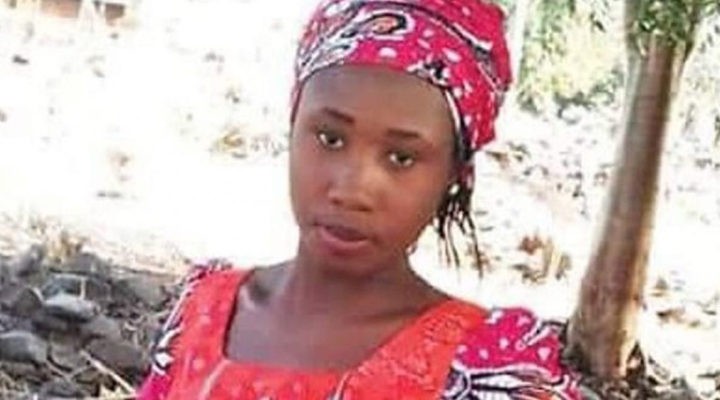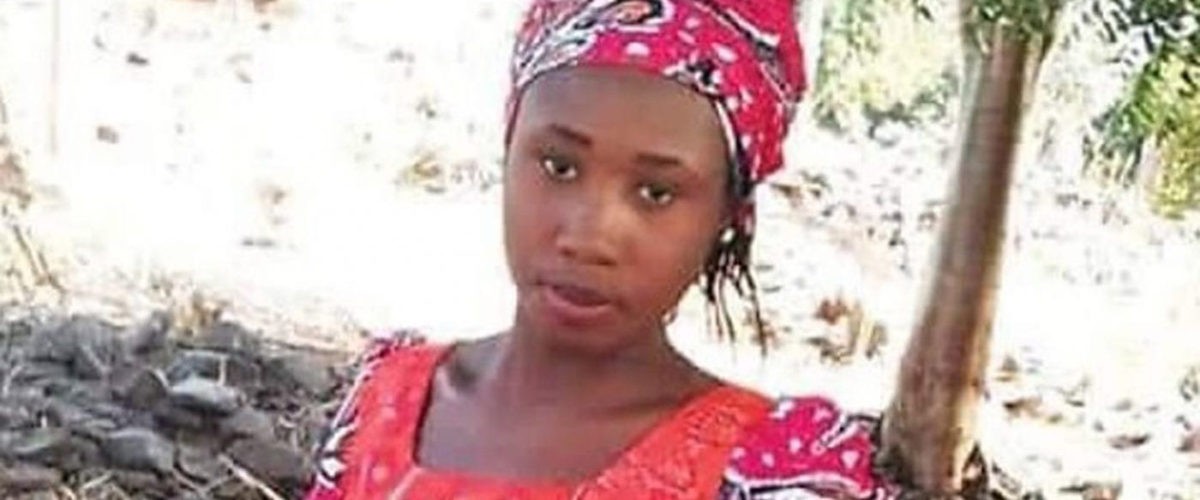In the last three years since a group of Boko Haram terrorists stormed and kidnapped 109 students from Government Girls’ Science and Technical College in Dapchi, Yobe State, in northeast Nigeria, much has changed except one thing: Only one of the victims, Leah Sharibu, has not been released.
While little to nothing has been heard from her since her abduction, Leah’s story has become the stuff of legends — a girl who, just 14 years of age at the time of her kidnapping on Feb. 19, 2018, suddenly transformed from a virtually unknown girl in a rural Nigerian town to an international figure, venerated and adored by many around the world. The affection is linked to Leah’s belief and stance.
Various sources, including some of the released schoolgirls, say Leah is being held by the terrorists because of her refusal to renounce her Christian faith.
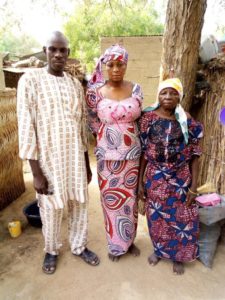
Leah’s parents, Natha and Rebecca Sharibu, with her grandmother (Photo: Open Doors International)
Like many states in Nigeria’s northern region, Islam is the major religion in Yobe State, followed by Christianity. Leah, daughter of Nathan and Rebecca Sharibu, has become the unlikely symbol of defiance in the face of religious persecution.
Last week’s third anniversary of her abduction drew attention to her plight once again, with many churches and faith-based organizations across the world not only remembering her in prayers but asking questions as to why, despite the Muhammadu Buhari government’s promises to secure her release, she remains in captivity.
Leah is, however, not the only girl currently being held by Boko Haram. There are many others, both Muslim and Christian girls, in the terrorist dens, including many students of Government Secondary School, Chibok, who were kidnapped in April 2014. Although some of the 276 kidnapped Chibok girls have been released, more than half of them still remain in captivity seven years after.
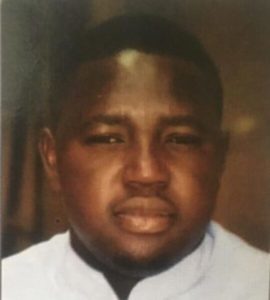
Philibus Inda Yakubu
Recalling the incident of Feb. 19, 2018, Philibus Inda Yakubu, chairman of Yobe State Chapter of Christian Association of Nigeria, said he “felt very bad and disappointed in security agencies and the government of Yobe State.” But Ibrahim Gaidam, the governor of Yobe State, put the blame squarely at the doorstep of the military.
When he hosted his counterpart from nearby Borno State who paid him a sympathy visit, Gaidam reportedly said: “I blame the whole attack on Dapchi, on the military and the defense headquarters who withdrew troops from Dapchi. The attack occurred barely a week after the military withdrew the soldiers from there. Before then, Dapchi has been peaceful, there was never such incident. But just a week after they withdrew the troops, Boko Haram came to attack the town.”
He added that such withdrawal tactics by the military in another part of the state previously led to loss of lives of many students. “Let me be quoted anywhere: The military must take blame for the attack on Dapchi. The same thing happened in 2013 when the military suddenly removed troops guarding the town (Buni-Yadi) and a week later Boko Haram went there to attack the town and the secondary school there killing 29 students.”
Yakubu pointed out that, since the abduction of Leah, the church community has not ceased to pray and clamor for her release.
“Since the abduction of Leah, the church community has not ceased to pray and clamor for her release.”
“The State CAN has really championed the cause of Leah,” he explained. “Several prayer services were held, a peaceful protest march, several press releases and supporting the family financially, paying them solidarity visits many times and praying with them. The Church or CAN is an advocacy voice for the voiceless. The church spoke strongly for her release as its duty, but securing her release is the major task of the federal government that took an oath of securing lives and property.”
Comparing the security situation in Yobe today to that of 2018, the clergyman said: “To be fair, there is improvement in security in Yobe State.”
But it is not so in many other Nigerian states. In fact, just last week, in what could either pass as coincidence or design, armed men on Wednesday, Feb. 17, just two days to the third anniversary of Leah’s abduction, stormed a boarding school — Government Science Secondary School in Kagara district of Niger state, north central Nigeria — at midnight, killed one student and kidnapped 42 people, including 27 students.
Two months before this incident, armed men believed to be Boko Haram terrorists swooped on a boys’ boarding school in Kankara, Katsina state, and shepherded more than 300 students out of the environment. It took days and negotiations with top Nigerian government officials before they were released. Although details of the negotiation were not disclosed by government officials, Boko Haram is known in the past to have requested to swap its prisoners with some of their fighters arrested by Nigerian security officials. Besides that, financial negotiations are also not uncommon in such negotiations as kidnap for ransom is common among criminal elements in the country generally.
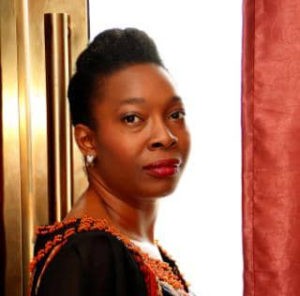
Ngozi Kunuji
Ngozi Kunuji, a Lagos-based development professional, is “angry, sad, disappointed and frustrated” that Leah is yet to regain her freedom, three years after being taken hostage. She fears that Boko Haram’s tactics of invading and kidnapping students from schools might have an effect on school enrollment in the northern part of the country particularly.
“For a country with a high percentage of disadvantaged children, especially the girl child at the lowest level of literacy and numeracy, it is disheartening to have the fabric of Nigeria’s education system further under attack,” she said. “While I do not readily have the statistics, it is no-brainer that school enrollment and participation in the northern part of Nigeria has further reduced from its already abysmally low enrollments as a result of the incessant cases of raiding of schools and kidnapping of students.
“These attacks or raids have and will adversely impede the socio–economic development of Nigeria and move us further behind in the scheme of things. It is often said that women are the foundation and bedrock of any society. This assertion is premised and driven by the importance of girl child education.”
“The idea that it is no longer safe for our children to get an education is frightening.”
She added: “As a citizen of Nigeria, I am concerned, fearful and worried for my life and that of our children. The idea that it is no longer safe for our children to get an education is frightening. My appeal to the commander in chief, security chiefs and security operative is that they should do their jobs, protect the citizenry irrespective of their religious persuasion. It is a mental torture to hear of and imagine the plight of innocent children such as Leah desirous to improve themselves.”
“As a woman, wife and mother … the thoughts of what she must be going through with her captors leaves a gaping feeling, and the fact that a teenager is meant to choose between her faith and freedom is unthinkable,” Kunuji continued. “On the other hand, I admire her resolve that points to the strong upbringing and faith, as I am sure many people, even adults, will be quick to make that renouncement just to be free. She is one strong girl.”
To mark the third anniversary of Leah’s abduction, The Leah Foundation, which was set up in her honor, declared seven days of prayer from Feb. 13 to 19.

Kyle Abts
Kyle Abts, spokesperson for the foundation, told BNG: “The latest verified information that she was still alive was earlier in the year 2020 when a released captive stated that she was still in captivity. There were rumors that she was forced to marry a Boko Haram leader and had given birth to a baby boy, but this was not verified by freed captive(s). Leah’s family are thankful that she was shown to be alive but want the government to work toward her release. The Nigerian government remains silent to the media and the family about any negotiations or details pertaining to Leah.”
He explained that Leah’s parents “are concerned that their daughter has been in captivity for three years … and want the Nigerian government to perform and/or give them an update to anything that they are doing.”
Abts called for the international community not to relent in advocating for Leah’s release. “We continue to need the international community to raise their voices either with their political representatives demanding that the Nigerian government take action to release Leah Sharibu (and other girls in captivity) and share the concern via social media.”
At the time of the Dapchi abduction three years ago, President Muhammadu Buhari deplored the incident as a “national disaster” and charged the military to go after the terrorists. When Leah failed to return with her mates, the government on various occasions promised that no efforts will be spared to rescue her.
So far, Leah’s advocates say, the result has been nothing short of disaster.
Anthony Akaeze is a Nigerian-born religion writer who currently lives in Houston. He covers Africa for BNG.

